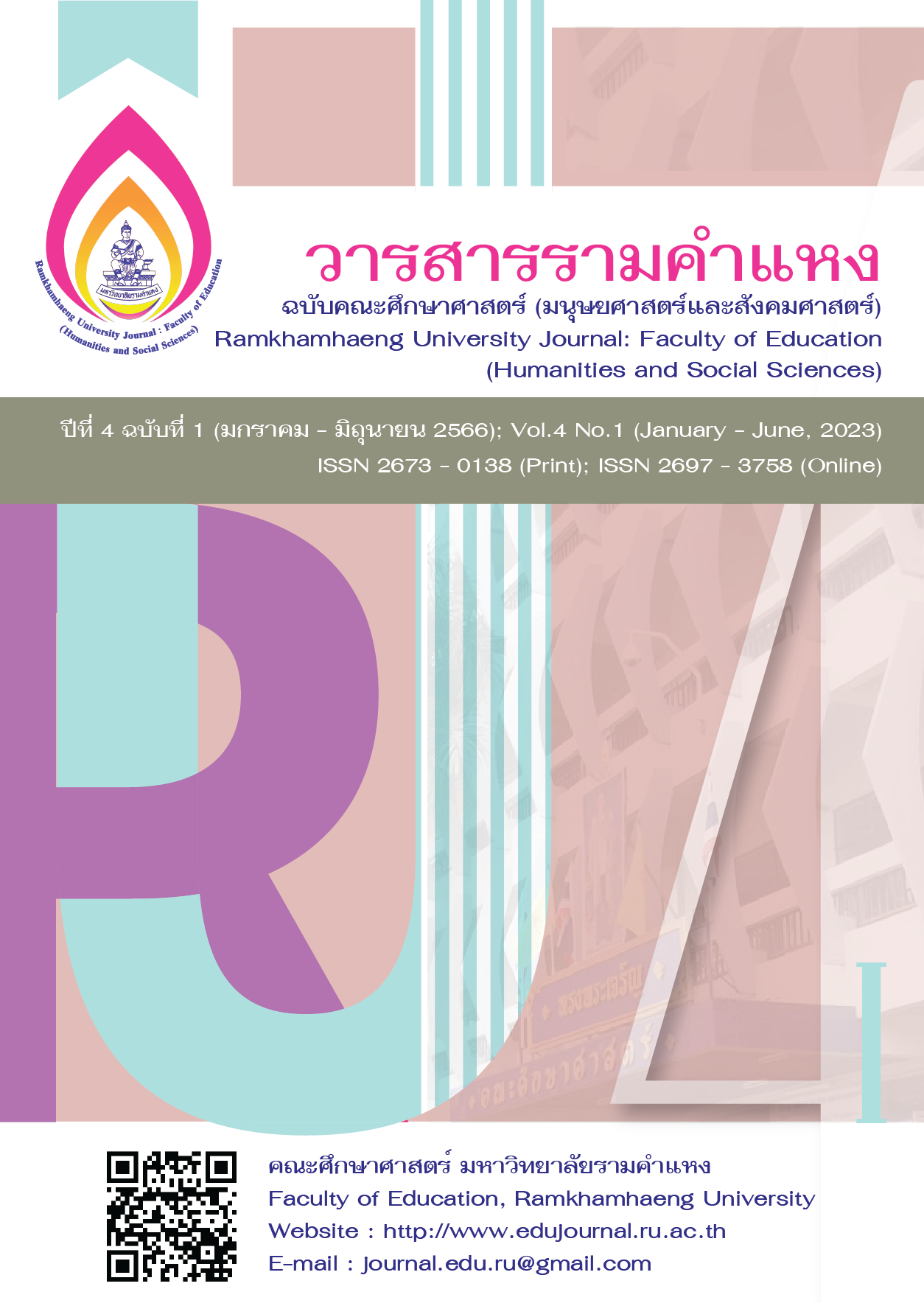 PDF ผู้แต่ง : ภีราภรณ์ บุญทอง, กมลทิพย์ ศรีหาเศษ, พนิดา พานิชวัฒนะ, กิตติศักดิ์ เชื้ออาษา (Peeraporn Bunthong, Kamontip Srihaset, Panida Panidvadtana and Kittisak Chue-Asa)
PDF ผู้แต่ง : ภีราภรณ์ บุญทอง, กมลทิพย์ ศรีหาเศษ, พนิดา พานิชวัฒนะ, กิตติศักดิ์ เชื้ออาษา (Peeraporn Bunthong, Kamontip Srihaset, Panida Panidvadtana and Kittisak Chue-Asa) Keyword : พฤติกรรมความมีวินัยในตนเอง, การเรียนออนไลน์, การวิเคราะห์องค์ประกอบเชิงสารวจ,self-discipline; online learning; exploratory factor analysis
Page : 1 - 14
Hit : 113
วารสารรามคาแหง ฉบับคณะศึกษาศาสตร์ (มนุษยศาสตร์และสังคมศาสตร์)
Vol.4 No.1 (มกราคม-มิถุนายน 2566)บทคัดย่อ
การวิจัยครั้งนี้มีวัตถุประสงค์เพื่อศึกษาองค์ประกอบพฤติกรรมความมีวินัยในตนเองในการเรียนออนไลน์ของ นักศึกษาระดับปริญญาตรีมหาวิทยาลัยรามค าแหง ใช้การวิจัยเชิงส ารวจ กลุ่มตัวอย่างคือนักศึกษาระดับปริญญาตรี มหาวิทยาลัยรามค าแหง จ านวน 1,045 คน โดยสุ่มตัวอย่างแบบชั้นภูมิ เก็บรวบรวมข้อมูลด้วยแบบสอบถาม ใช้การวิเคราะห์องค์ประกอบเชิงส าารวจในการวิเคราะห์ข้อมูล สกัดองค์ประกอบด้วยวิธี Principal Component Analysis และใช้การหมุนแกนแบบ Varimax ผลการวิจัยพบว่า องค์ประกอบพฤติกรรมความมีวินัยในตนเอง ในการเรียนออนไลน์ของนักศึกษาระดับปริญญาตรีมหาวิทยาลัยรามค าแหง มีจ านวน 5 องค์ประกอบ ประกอบด้วย ความขยันอดทนและรับผิดชอบ ความตั้งใจและเชื่อมั่นในตนเอง ความตรงต่อเวลา การควบคุมตนเอง และการมีสมาธิ ในการเรียน ทั้ง 5 องค์ประกอบเหล่านี้สามารถอธิบายความแปรปรวนพฤติกรรมความมีวินัยในตนเองในการเรียน ออนไลน์ของนักศึกษาระดับปริญญาตรีมหาวิทยาลัยรามค าแหงได้ร้อยละ 62.523
Abstract
The purpose of this study was to examine the factors of self-discipline behavior in online learning among undergraduates of Ramkhamhaeng University using survey research and the technique of stratified random sampling. The sample population consisted of 1,045 undergraduates. Data was collected using a questionnaire and analyzed using the technique of exploratory factor analysis with principal component analysis and varimax rotation. The findings showed that self-discipline behavior in online learning among undergraduates of Ramkhamhaeng University consisted of five factors. These were diligence and responsibility, determination and self-confidence, punctuality, self control, and concentration in studying. These five factors could be explanatory of the variance of self-discipline behavior in online learning among undergraduates of Ramkhamhaeng University under study at 62.523 percent.
Reference
Kaewpila, P., & Thongprong, A. (2021). Teacher’s Opinions on Self-Discipline of Secondary School
Student in Group 6 Under the Secondary Educational Service Area Office 1. Journal of Roi
Kaensarn Academi, 6(3), 173-184. (in Thai)
Khamanee, T. (2013). Teaching style: A variety of options. Bangkok: Chulalongkorn University Press.
(in Thai)
Klahan, N. (1997). Development of ethics and self-discipline through group activities: A case study of
grade 4 students at Ban Don Lamduan School. [Master's Thesis, Khon Kaen University].
(in Thai)
Landrum, B. (2020). Examining students’ confidence to learn online, self-regulation skills and
perceptions of satisfaction and usefulness of online classes. Online Learning, 24(3), 128-146.
https://doi.org/10.24059/olj.v24i3.2066
Mhuensurin, W., & Poopayan, P. (2021). The factors affecting student’s discipline in secondary level
students of extended schools under the office of Chaiyaphum Primary Educational Service
Area 2. Academic and research journals Northeastern university, 11(3), 228-242. (in Thai)
Mou, T. Y. (2021). Online learning in the time of the COVID-19 crisis: Implications for the self-regulated
learning of university design students. Active Learning in Higher Education, 1–21.
https://doi.org/10.1177/146978742110512
Na PomPetch, P. (2005). The encouragement guidebook: 29 lessons for success and happiness
(2nd ed.). Bangkok: 108 ideas press. (in Thai)
Ngah, A. H., Kamalrulzaman, N. I., Mohamad, M. F. H., Rashid, R. A., Harun, N. O., Ariffin, N. A., & Osman,
N. A. A. (2022). The sequential mediation model of students’ willingness to continue online
learning during the COVID-19 pandemic. Research and Practice in Technology Enhanced
Learning, 17(1), 1-17. https://doi.org/10.1186/s41039-022-00188-w
Office of the National Culture Commission, Thailand (1997). Project to strengthen student discipline
across the country. Bangkok: Chongpon Trading. (in Thai)
Pangsai, S. (2004). Developing the operations to strengthen student discipline at Ban Phai School, Thawat
Buri District, Roi Et Province. [Master's Thesis, Srinakharinwirot University]. (in Thai)
Photemei, W. (2005). Developing student discipline on cleanliness at Kae Pe Rat Niyom School,
Muang District, Kalasin Province. [Master's Thesis, Mahasarakham University]. (in Thai)
Plawat, K. (1996). The effect of group counseling and group process on self-confidence of
Mathayomsuksa 1 students at Ban Kut Kwang Prachasan School, Muang District, Khon Kaen
province. [Master's Thesis, Khon Kaen University]. (in Thai)
Raksasub, S. (1991). Comparison of the effects of PREMAC and social reinforcement on the math
study attention behavior of students in grade 6, Raksappittayakon School, Kabinburi District,
Prachinburi Province. [Master's Thesis, Srinakharinwirot University]. (in Thai)
Sadiku, M. N., Adebo, P. O., & Musa, S. M. (2018). Online teaching and learning. International Journals
of Advanced Research in Computer Science and Software Engineering, 8(2), 73-75.
Saengnga, S. (2019). Development self-discipline of early childhood by experience with music
activities by Carl Orff, Ban Khwao Schoolม Muang District, Chaiyaphum Province. ARU
Research Journal, 6(3), 61-68. (in Thai)
Saothong, T. (2018). Self-discipline of student of Stuk School under The Secondary Educational
Service Area Office 32. [Master's Thesis, Burapha University]. (in Thai)
Shahijan, M. K., Rezaei, S., & Amin, M. (2016). International students’ course satisfaction and
continuance behavioral intention in higher education setting: an empirical assessment in
Malaysia. Asia Pacific Education Review, 17(1), 41-62. https://doi.org/10.1007/s12564-015-
9410-9
Sitthiphonworavej, J. (2018). Attitudes towards self-discipline in the domain of classroom discipline,
study hardiness, and motivation for academic achievement of students in the vocational
certificate level, Year 2, Attawit Commercial Technology College. Bangkok: Attawit
Commercial Technology College. (in Thai)
Songsuwan, W. (2000). The effect of using the addition and subtraction learning package on learning
achievement, self-discipline, and learning durability in mathematics of grade 3 students.
[Master's Thesis, Srinakharinwirot University]. (in Thai)
Srikalasin, K. (2001). Student discipline. Encyclopedia of Education, 22, 7-14.
https://ejournals.swu.ac.th/index.php/ENEDU/article/view/6001/5636 (in Thai)
Thanomklai, C. (1996). Development of self-discipline in patience of pre-elementary children with
different intelligences by means of storytelling with hand puppets using questions in pre,
during, and after storytelling. [Master's Thesis, Srinakharinwirot University]. (in Thai)
Thiwakorn, N. (2005). The 4 MAT religious activities handbook. Surat Thani: Diocese Pastoral Center.
(in Thai)
Tirakanant, S. (2012). The multivariate analysis in social science research (2nd ed.). Bangkok:
Chulalongkorn University Press. (in Thai)
Tirakanant, S. (2014). Research Methods in Social Sciences: A Guide to Practice. Bangkok:
Chulalongkorn University Press. (in Thai)
Zhao, R., & Kuo, Y. L. (2015). The role of self-discipline in predicting achievement for 10th graders.
International Journal of Intelligent technologies and applied statistics, 8(1), 61-70. https://doi
.org/10.6148/IJITAS.2015.0801.05

